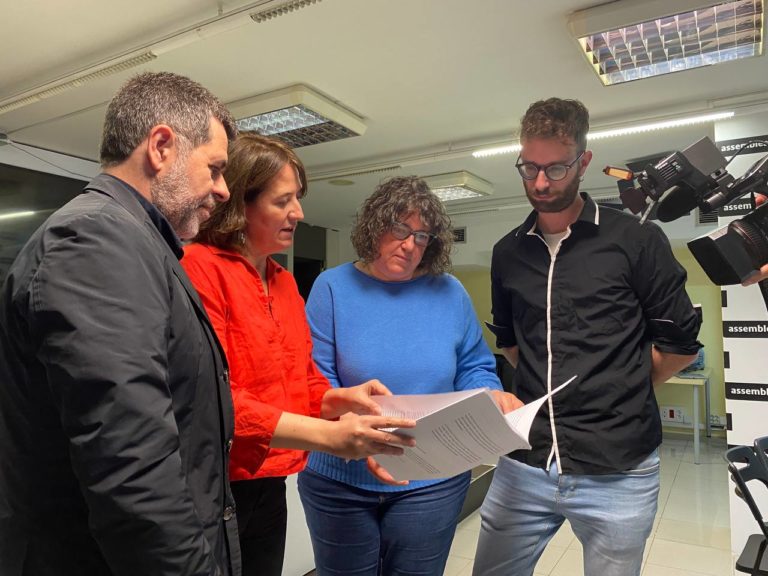
The Catalan civil society organization, five of whose members were targeted by the Catalangate Pegasus espionage case, filed a lawsuit against Spanish authorities on Tuesday in a Barcelona court, for violations of the right to privacy and association.
Assemblea’s attorney, Toni Abat I Ninet, filed a criminal lawsuit in representation of the organization on Tuesday, May 10th, in the court of Instruction nº32 in Barcelona, for violations of the privacy, freedom of assembly and other fundamental rights of the president, Elisenda Paluzie and several members of the organization, victims of the Pegasus spyware. Five of the Catalan National Assembly members were affected by the Catalangate affair: the illegal political espionage targeted at Catalan pro-independence representatives and activists by hacking into their mobile devices between 2015 and 2020.
The purpose of this lawsuit is to call on the court to begin with the proceedings and actions it deems necessary in order to ascertain who is behind these criminal acts. Although the identity of the perpetrators of these crimes is unknown, Assemblea’s legal defense team argues that from the very description of the facts and the possible political interest that the information that the lawsuits contain, the perpetrators must be members of the Spanish state’s security forces. More specifically, due to the criminal nature of the activity and use of the Pegasus spyware, they would be members of the National Intelligence Center or any specific division of the state security forces, such as the National Police or the Civil Guard, who would have had access to this espionage tool.
As stated by Assemblea’s attorney, the lawsuit denounces the violation of several fundamental rights, such as the violation of the right to privacy and the right of association. In the first case, Mr. Abat Ninet argued, “the evidence provided shows the use of the Pegasus spy program” in order to access conversations, messages, documents and private observations of those affected, being constitutive of one or more criminal offenses established in article 197 of the Penal Code. Mr. Abat Ninet added that “the use of an espionage program against citizens, targeted for having specific political ideas and for being members of civil society organizations that carry out activities to achieve their legitimate political goals is an act of an undemocratic and illegitimate nature and, in addition, it implies a flagrant violation of the fundamental right to privacy established in the article of the Spanish Constitution, and that is extended by Organic Law 1/1982”.
Additionally, Assemblea President Elisenda Paluzie, explained that with these charges they are looking to “showcase the flagrant violation of fundamental rights that the Spanish state commits against the Catalan pro-independence movement, and that they hope that this case will have important judicial and political consequences.
With regard to the right of association, the President insisted that “the sole link between the plaintiffs is the fact that we have been or are still part of the same organization” and that “Associations have special protection under rule of law.”
Additionally, the lawsuit denounces a violation of the fundamental right of association. The use of Pegasus against the plaintiffs for being members of a registered and lawful association, in addition to a total monitoring, absolute interference in the space of privacy, also involves a violation of Article 22 of the Spanish Constitution. According to Mr. Abat Ninet, “anything that is not expressly prohibited by law can be exercised through the right of association.”
We recall that the Catalan National Assembly has so far had a total of 5 victims: the current president Elisenda Paluzie (four attacks and a proven infection, between 2019 and 2020), the former president of the entity, Jordi Sànchez (twenty-six attacks between 2015 and 2017 and one in 2020), board members Sònia Urpí (two attacks in 2020) and Arià Bayé (one attack in 2020), and grassroots member Jordi Domingo (one attack in 2017).